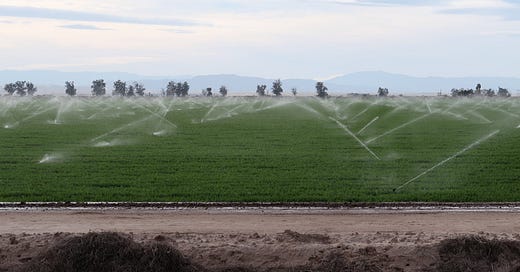This week’s post is very short because the ideas in it are very big.
Agriculture is the single largest human land-use on earth in terms of acreage, which is to say, in terms of habitat destruction. As currently practiced, it is destroying top soil, depleting aquifers, polluting earth and water and air, making dead zones in the ocean, and displacing and killing wildlife, to say nothing of its climate effects. Here are six things that must happen to make it less terrible:
De-monetization:
Farmers should be well compensated for their labor, but it should not depend on the vagaries of the market or the crony-controlled policies of the corporate state. We must disconnect food production from the profit motive.
De-corporatization:
This would perhaps naturally follow demonetization, but we need to make it explicit anyway. The food supply should be in the hands of people, not faceless business entities.
De-mechanization:
The severing of food growing from human hands has been a disaster. Contamination and disease have accompanied mechanization, as has a decline in the quality and flavors of foods as they are bred primarily for processing. Using fewer machines means we’ll need more humans, but the joys of working outdoors, closer to nature, would appeal to many if they were given the option.
Re-localization:
The distance from farm to fork must be reduced as much as possible. True, not every region of the country can raise every kind of food for simple reasons of climate, so Florida and California will always need to trade citrus to New England and the Pacific Northwest for apples, but the days of Fujis from New Zealand and the 1500 mile salad have to end.
Re-Seasonalization:
This would largely be a consequence of relocalization and what it means is that all food will not be available year-round anymore. Fresh tomatoes, sweet corn and watermelons will be a summer treat. The colder months will be the time of winter squash, roots and hardy greens. Rather than considering this arrangement a hardship, it can be the start of a re-engaged place-based consciousness. Our unhappy rootlessness as a culture is exacerbated by our disconnection from the cycles of the seasons where we live. Once we rediscover the rich scrumptiousness of vine-ripened heirloom tomatoes, warm from the sun, we won’t want the pale, firm, mealy abominations they peddle in January. This appeal of the authentic eventually dulls the appetite for the fake, and applying that to living at large, not just our diets, would be beneficial to us not only as individuals but as a society.
Re-naturalization:
It’s time to drop the chemical inputs, genetic modification, and monocropping. Our practices must return to regenerative methods that work with natural processes, instead of against them. We’ve knocked things so far out of balance that the road back to health will be challenging, but the sooner we get to it, the better. Ultimately, this path leads to re-wilding and to pre-agricultural wildtending practices but that’s a whole ‘nother subject.
(Excerpted and adapted from a longer article I wrote in May 2020.)






Thank you Kollibre. I miss seeing you on FB, but I get it.
What you've written is so true! I commend you. Fixing it is a huge job, though. But it has to start somewhere, amidst the so many other problems in this world! I remember, back when the taste of a real tomato. It's been sooo long.